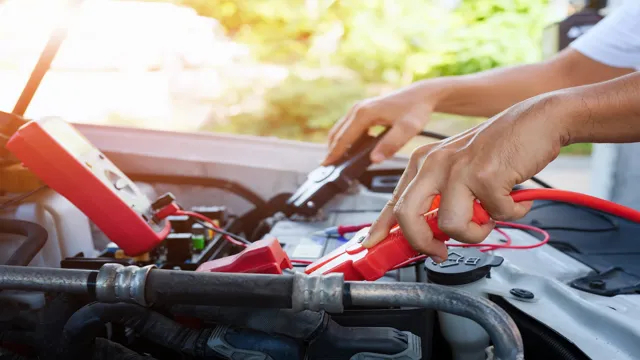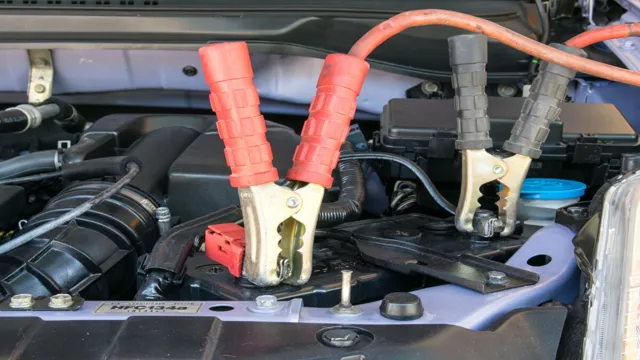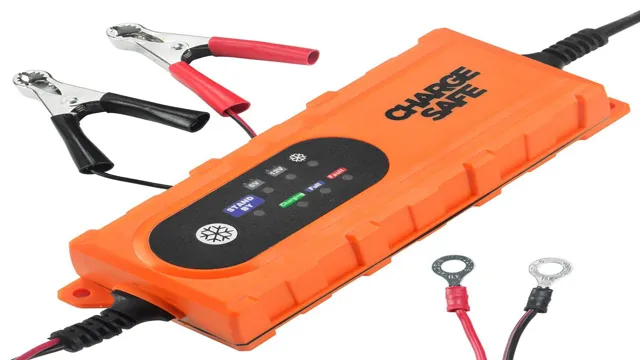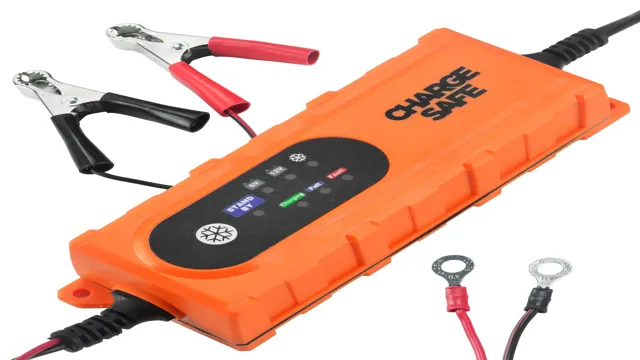When to Use a Car Battery Charger: A Beginner’s Guide to Optimal Charging Practices

Have you ever experienced the frustration of a dead car battery? It always seems to happen at the most inconvenient time, leaving you stranded and scrambling for a solution. That’s where a car battery charger comes in handy. By providing a quick and easy way to charge your battery, a car battery charger can save you time, money, and hassle.
But when is the right time to use one? In this article, we’ll explore the different situations in which using a car battery charger can be beneficial and helpful tips for getting the most out of your charger. So, whether you’re a commuter, car enthusiast, or someone who just wants to be prepared, keep reading to learn more about when to use a car battery charger!
When Your Battery is Low
When your battery is low, it can be frustrating and potentially dangerous if you’re stuck in the middle of nowhere. That’s when you need to use a car battery charger. It’s essential to check the battery before attempting to recharge it, as this may indicate an underlying problem that needs fixing.
A car battery charger can be used if you notice your headlights are dimming, or the engine is turning over more slowly than usual. It’s also useful if you aren’t using your vehicle frequently, which could cause the battery to lose its charge over time. A car battery charger is an easy and effective way to charge your battery and get you back on the road in no time.
Don’t get caught out with a flat battery; invest in a charger today!
If your car won’t start or is struggling to turn over, it’s likely your battery is low.
When your car won’t start or is struggling to turn over, it’s likely your battery is low and needs recharging or replacement. Your car battery is a crucial component that provides the electrical power needed to start the engine and run your car’s electronics. If your battery is weak or dies completely, you won’t be able to start your car, and you’ll be stranded.
To avoid this frustrating situation, it’s essential to keep an eye on your battery’s performance and maintain it regularly. You can check your battery’s voltage with a multimeter or have it tested at an auto parts store. If your battery is low, you can recharge it using a battery charger or replace it if it’s beyond repair.
Keeping your battery healthy ensures a smooth ride without any unexpected breakdowns, so be sure to give it the attention it deserves.

Charging the battery is a quick and cost-effective solution to get your car running again.
Charging your car battery can be a quick and cost-effective solution to get your car running again when you find your battery is low. With our busy lives, it’s easy to forget to turn off the headlights or leave the car’s interior lights on. And this, over time, can drain the battery and lead to a low voltage situation.
That’s where a battery charger comes in handy. You can always keep one in your trunk in case of emergencies or have it as part of your car’s kit. It’s simple and easy to use; you just attach the charging cables to your battery, plug in the charger, and wait for the battery to charge up.
You can also ask your mechanic to check the battery’s condition and give it a quick charge. Just like your phone’s battery, a car battery needs to be charged occasionally to keep its performance up to scratch. So, don’t despair if you find yourself with a flat battery.
A quick and easy solution is just a charge away.
Before a Long Period of Inactivity
When it comes to car batteries, it’s better to be safe than sorry. If you know that your car is going to be sitting idle for a long period of time, it’s important to ask yourself, “When to use a car battery charger?” The answer is simple: before the long period of inactivity. When a car battery is left unused for a long time, it can lose its charge and even become damaged.
By using a car battery charger before the period of inactivity, you can ensure that it stays charged and ready to go when you’re ready to use your car again. It’s also a good idea to use a charger that has a “maintenance” or “trickle” mode, which will keep the battery at a full charge without overcharging it. So, don’t wait until it’s too late, take preventative action and use a car battery charger before your car sits idle for an extended period of time.
If you plan on leaving your car unused for an extended period of time, it’s important to keep the battery charged.
If you’re planning on leaving your car untouched for an extended period of time, there are a few things you should consider to keep it in good shape. One of the most important things is to make sure your battery is charged. An unused battery can quickly lose its charge, and if it’s left completely flat for a long time, it may even need to be replaced.
To avoid this, try to start your car at least every few days and let it run for a few minutes. Another option is to buy a battery tender or trickle charger, which will keep your battery charged even when your car is not in use. These are easy to install and can be left attached to your battery for an extended period of time without causing any damage.
By taking a few simple steps to keep your battery charged, you can ensure that your car will be ready to go when you are, and you won’t have to deal with any unpleasant surprises.
Leaving a battery completely drained can lead to permanent damage.
Battery damage can occur when a battery is left completely drained for an extended period. If you’re planning on being away from your device for a while, it’s important to take steps to prevent permanent damage. One way to do this is by charging the battery to about 50% before storing it.
This ensures that the battery has enough charge to maintain its health and prevent it from draining completely. You could also use a battery maintenance device that slowly charges and discharges the battery to keep it from losing its charge. Leaving a battery to drain completely can cause the battery to reach a critical state, where it can no longer hold a charge.
This can shorten the lifespan of the battery and can even render it unusable. Consider taking these small steps towards battery maintenance to keep your devices running smoothly even when they’re not in use.
Using a battery charger to keep the battery topped off can prevent this damage and ensure your car is ready to use when you return.
If you’re planning on leaving your car inactive for an extended period, it’s crucial to take the necessary steps to keep your battery healthy and functional. One of the most common issues with batteries is sulfation, which occurs when lead from the battery plates combines with sulfuric acid to create lead sulfate. This build-up can limit the battery’s ability to maintain charge and cause permanent damage.
To prevent this from happening, it’s advisable to use a battery charger to keep the battery topped off while the car is parked. A trickle charger or a smart charger can provide a low-level charge that prevents sulfation and ensures that your car will be ready to use when you return. In doing so, you’ll prolong the life of the battery and avoid any potential hiccups when you eventually return to your vehicle.
Don’t let a dead battery ruin your plans; invest in a reliable battery charger today!
To Maintain Battery Health
Knowing when to use a car battery charger is critical to ensure the long life of your car battery. It’s essential to check your car’s battery health regularly by using a reliable battery charger. By doing this, you can avoid any potential battery issues and avoid getting stuck on the side of the road.
One of the optimal times to use a car battery charger is when you notice that your car’s battery isn’t holding a charge as long as it used to. In such cases, it is best to use a battery charger to enhance the battery health and function properly. Additionally, if your car’s battery drain is due to leaving lights or electronics on, it is safe to use a car battery charger frequently to keep the battery in good condition.
Maintaining regular charging intervals is always advisable and can prevent any last-minute issues or costly repairs. Ultimately, using a car battery charger proactively can help you avoid unnecessary stress and inconvenience when you need to get your car running.
Regularly charging your battery can help maintain its health and prolong its lifespan.
Regularly charging your battery is crucial to maintaining its health and prolonging its lifespan. Just like how humans need to eat and exercise to stay healthy, batteries also have their own set of needs to keep them in optimal condition. When you charge your battery regularly, you’re ensuring that it has a consistent stream of energy and preventing it from becoming completely drained, which can cause long-term damage.
Think of it like watering a plant – if you don’t water it consistently, the plant may wilt and die. Similarly, if you don’t charge your battery regularly, it may lose its ability to hold a charge and ultimately fail. While it may seem counterintuitive, frequent charging can actually prevent overcharging and allow the battery to maintain a stable voltage, which in turn helps prolong its lifespan.
By taking the time to charge your battery on a regular basis, you’re not only extending its life, but also saving yourself the headache of unexpected battery failure. So, make it a habit to plug in your devices and keep them charged, just like how you prioritize your own health by eating well and exercising regularly. It may seem like a small task, but it can make a big difference in the long run.
This is especially important for cars with batteries that are not easily replaceable or are expensive to replace.
If you own an electric vehicle (EV), it’s crucial to maintain the health of your battery. This is especially important for cars with batteries that are not easily replaceable or are expensive to replace. To ensure that your battery remains healthy, there are a few steps you can take.
First, try to avoid charging your battery to 100% capacity, as this can put unnecessary stress on the battery. Instead, aim to keep your battery between 20% and 80% charged. Additionally, avoid letting your battery completely drain, as this can also harm the battery’s health.
It’s also a good idea to keep your EV in a cool place and out of direct sunlight, as high temperatures can damage the battery. By taking these steps, you can help extend the life of your EV’s battery and avoid the high cost of replacement.
When to Avoid Using a Car Battery Charger
If your car battery is not performing at its best, it might be tempting to reach for a car battery charger to give it a quick boost. However, there are certain situations when using a car battery charger is not a good idea. For example, if your battery is completely dead or damaged, attempting to charge it could be dangerous.
In such cases, it’s best to replace the battery with a new one. Additionally, if you’re not sure why your battery isn’t working properly, it’s recommended to have it checked by a mechanic before attempting to charge it. Finally, if you’re dealing with extreme weather conditions, such as high heat or freezing temperatures, it may be difficult to charge your battery effectively.
Overall, while a car battery charger can be a helpful tool for maintaining your battery’s health, it’s important to use it wisely and avoid potential hazards.
If your car battery is damaged, leaking, or has any other issues, do not try to charge it yourself.
car battery charger If you’re experiencing car battery problems, you may be thinking about charging it yourself. However, it’s important to know when to avoid using a car battery charger. If your battery is damaged, leaking, or has any other issues, it’s best to leave it to the professionals.
Trying to charge a damaged battery can cause a spark, which can lead to a dangerous explosion or fire. It’s not worth putting yourself and others at risk just to save a few bucks. Instead, take your car to a trusted mechanic who can diagnose the issue and replace the battery if necessary.
It’s always better to err on the side of caution when it comes to your car’s electrical systems. So if you’re experiencing any issues with your battery, don’t hesitate to seek professional help. Your safety and the safety of those around you should always be prioritized over anything else.
Instead, take it to a professional to avoid causing further damage or risking injury.
Car Battery Charger A car battery charger can be a handy tool to have around in case of emergencies. However, there are times when you should avoid using one altogether. For example, if the battery has been damaged or is leaking, you risk injury if you try to charge it yourself.
Similarly, if the battery is too old or has been overcharged, attempting to charge it with a car battery charger could cause further damage and shorten its lifespan. In these situations, it’s best to take the battery to a professional who can properly diagnose and repair the issue. While it may seem like a hassle, taking this step will ensure that your battery is functioning safely and efficiently for years to come.
Always remember, safety first!
Conclusion
In summary, the best time to use a car battery charger is when your battery needs a little boost. Think of it like getting a cup of coffee in the morning to jumpstart your day – sometimes your car battery needs that same kind of pick-me-up. And just like coffee, be sure not to overdo it or you may end up with more problems than solutions.
So, keep a charger handy and use it when necessary to keep your car running smoothly. After all, a happy car battery equals a happy car owner!”
With proper use, a car battery charger can be a valuable tool for keeping your car running smoothly.
While a car battery charger can be a lifesaver when your battery is low, there are some situations where you should avoid using one. For instance, if your battery has a hole or crack, attempting to charge it can be dangerous as the acid inside may leak and cause harm. Similarly, if your battery has been damaged in a fire or accident, you should not use a charger as it could further exacerbate the problem.
Additionally, if your battery is old and failing, a charger may only serve as a temporary solution and it may be more worthwhile to invest in a new battery altogether. It’s important to always exercise caution and use your best judgement when it comes to car battery care. By doing so, you can ensure that your car stays up and running for years to come.
Just make sure to only use it in the appropriate situations and always follow the instructions carefully.
Car Battery Charger Car battery chargers can be incredibly useful when your vehicle battery is running low or completely dead. However, in certain situations, it is best to avoid using these types of chargers. For instance, if your car battery is leaking, overcharged, or damaged in any way, it’s not safe to use a charger, as it can cause an explosion or other hazardous situations.
Furthermore, if you’re in a hurry, using a car battery charger may not be the best solution as it can take a while to charge a battery fully. It’s also essential to read the instructions carefully to avoid any mistakes that could compromise your safety or damage your car battery further. In conclusion, while a car battery charger can be a fantastic tool to save you from a dead battery, always proceed with caution and avoid using it in inappropriate situations to ensure your safety and prevent further damage to your battery.
FAQs
What are the signs that indicate that my car battery needs charging?
Dim headlights, slow engine cranking, and clicking sounds when turning the key are common signs that a car battery needs charging.
How often should I charge my car battery?
It is recommended to charge your car battery at least once every two weeks, especially if you are not using your car frequently.
What type of car battery charger should I use?
There are different types of car battery chargers, including trickle chargers, float chargers, and smart chargers. Choose a charger that is compatible with your car battery and follow the manufacturer’s instructions.
Can I use a car battery charger for other types of batteries?
It depends on the type of battery and the charger. Some chargers are designed for specific types of batteries, while others can work with different types. Always check the instructions and compatibility before using a charger with other types of batteries.
Can overcharging damage my car battery?
Yes, overcharging can damage your car battery and reduce its lifespan. Make sure to monitor the charging process and follow the recommended charging time and voltage.
How long does it take to fully charge a car battery?
The charging time depends on the type of charger, the battery capacity, and the charging rate. It can take between 4 to 24 hours to fully charge a car battery.
What should I do if my car battery does not hold a charge?
If your car battery does not hold a charge, it may be time to replace it. However, it could also be due to other issues such as a faulty alternator or electrical problems. Consult a professional mechanic to determine the root cause of the problem.



